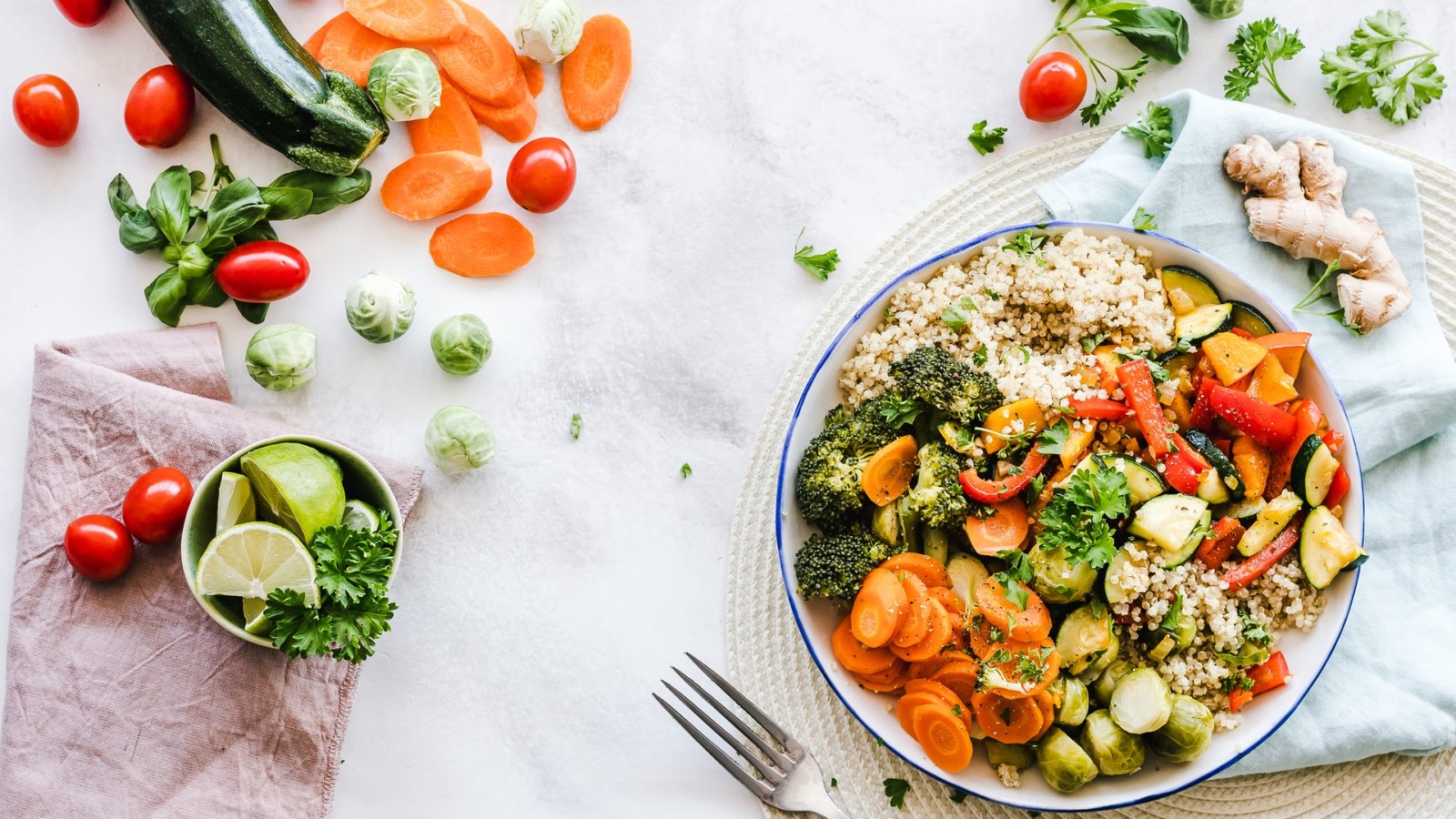Growing up, I was angled with serious allergies and sinus issues. As a result, I spent most mornings congested and feeling stuffy. Suffice to say, the last thing that I wanted to do was chow-down on breakfast.
As I’ve gotten older, I’m still not much of a breakfast eater. I have nothing against the food — but who doesn’t enjoy eggs and bacon — or just bacon and bacon? I’m just not much of eating bright and early. And what is the cost to your health of eating overly fatty foods too often?
If I’m hungry, sure — I’ll eat a little something. Usually, however, I’m sipping on a little juice. But that means lunch is extremely important for me. It turns out, though, that lunch might actually be the most important meal of the day — sorry, breakfast.
Hey, I’m not alone here. There are plenty of people who eat the same lunch every day.
Prioritizing lunch helps you avoid the afternoon crash. A great lunch means that you don’t have the caffeine crash in the afternoon — which may be interfering with your sleep. Remember, caffeine has a half-life of about 5 hours.
Also, lunches give us a much-needed break from work. Taking frequent breaks throughout the day can make you more productive. And, it gives us a chance to get away from our workplace and change our environment.
“We know that creativity and innovation happen when people change their environment, and especially when they expose themselves to a nature-like environment, to a natural environment,” says Kimberly Elsbach, a professor at the University of California, Davis Graduate School of Management, who studies workplace psychology.
“So staying inside, in the same location, is really detrimental to creative thinking. It’s also detrimental to doing that rumination that’s needed for ideas to percolate and gestate and allow a person to arrive at an ‘aha’ moment,” Elsbach told Jeremy Hobson, host of Here & Now.
To really get the most out of your lunch, you also need to eat the right food. You might be craving a cheeseburger. But, that’s not good for your health or productivity.
For me, I’ve been able to resist these temptations by eating the same meal for lunch every day. But, I’ve also noticed that there are some other advantages to the practice of eating the same lunch.
The Pros of Eating the Same Lunch Every Day
Keep your weight in check.
As long your meal is healthy and balanced, which means it’s loaded with fruits and veggies with a good protein — you should be able to keep your weight in check. More specifically, if you’re counting calories — you’ll be taking in the same calories at lunch, so, it’s easy to keep track of.
For example, I have a friend who was trying out Weight Watchers. While she was able to lose weight, the calorie counting could be laborious. The counting is not a problem when you have the same lunch daily since you know how many calories it already contains.
Makes planning a breeze.
If you’re on a budget, both in terms of time and money, then this is a no-brainer.
When you make your grocery list, you know exactly where every item you need is located. You also know how much this meal costs — every time. And, you also know how long it will take you to prep.
Furthermore, if you prep your lunch on a Sunday for the entire week, that means you don’t have to do this task daily. That doesn’t just mean you save time preparing and cooking. You also don’t have to wash and put away knives, cutting boards, pans, or whatever you needed to make your dish.
As an additional perk, prep all at once, eating the same thing saves your energy reserves. I’m talking about the physical energy needed to prepare meals and the mental energy required for deciding what to make.
Boosts your productivity.
I’ve read about boosting productivity. On average, we make 35,000 decisions per day. While that may sound excessive, we do make a lot of decisions on a daily basis. Eventually, this can lead to decision fatigue and decision overload.
Research shows that when we have too many choices, this can decrease physical stamina and the ability to persist in the face of failure. What’s more, decision-overload can result in procrastination. You’re also more likely to get distracted and make poorer decisions.
To be real, I doubt that having to choose between a quinoa sandwich or turkey on whole wheat is going to derail your productivity all that much. But, having one less decision to make wouldn’t hurt.
Reduces stress and anxiety.
Meal planning doesn’t just reduce the stress and anxiety of scrambling to figure out what to eat at lunchtime. It also allows you to select foods that can manage stress and anxiety. Examples include:
- Foods that are naturally rich in magnesium, such as leafy greens, spinach, nuts, legumes, and whole grains.
- Zinc-rich foods like oysters, cashews, egg yolk, and beef.
- Fatty fish, think wild Alaskan salmon, that contain omega-3 fatty acids.
- Probiotic-rich foods such as pickles.
- Foods that are rich in B vitamins like almonds and avocado.
Encourages healthy eating habits.
By making more informed decisions about what you’re eating can help you fight back against junk food. Just think about the times when you’re hungry and don’t have a healthy snack or meal on-hand. You’re more likely to hit up the vending machine or a fast-food option.
Additionally, the more you eat something, the more likely it will become an atomic habit. For example, if you always have a salad, then you aren’t making the conscious to eat healthily.
The Cons of Eating the Same Lunch Every Day
Despite the advantages of eating the same lunch day-in-and-out, there are also some major drawbacks that you must be aware of.
Redundancy.
Routines can be helpful. It provides structure and predictability in an uncertain world. On the flip side, this can get incredibly boring. And, that can put you into a rut.
More concerning, those who are easily bored may be more susceptible to depression, anxiety, anger, academic failure, poor work performance, loneliness, and isolation. Variety, however, is the spice of life.
Nutritional deficiencies.
“Our bodies need a wide range of macro-and micronutrients, and eating a wide variety of foods, especially fruits and vegetables, can help us meet our body’s needs,” says Wesley Delbridge, RDN, spokesperson for the Academy of Nutrition and Dietetics.
“Micronutrients are nutrients that a person needs in small doses,” explains Jenna Fletcher for Medical News Today. They usually “consist of vitamins and minerals.” And, while “the body only needs small amounts of them, a deficiency can cause ill health.”
More importantly, vitamins are packed with the following health benefits;
- Boosts the immune system.
- Helps prevent or delay certain cancers, such as prostate cancer.
- Supports healthy blood and skin.
- Strengthens teeth and bones.
- Helps metabolize carbs and protein.
- Aids in the brain and nervous system functioning.
“Macronutrients are nutrients that a person needs in larger amounts,” adds Fletcher. “Macronutrients include water, protein, carbohydrates, and fats.” Adding these to your diet is also essential as they can encourage;
- The growth and development of muscles, bones, hair, and skin.
- Form antibodies.
- Serve as a fuel source for cells and tissues — when needed.
- Reduce the risk of heart disease and type 2 diabetes
- Balance blood sugar.
- Improve brain and immune function.
- Energy to perform tasks.
Overall, we need to have a “healthful, balanced diet that includes lean proteins, vegetables, fruits, complex carbohydrates, and water will get the nutrients they need,” advises Fletcher. And, eating the same meal for lunch every day might not be meeting those requirements.
Risk of metabolic disease.
Having a varied mix of nutrient-dense foods is also beneficial to your metabolic health. At least, that’s what a 2015 study found.
Why’s that important? Because this can lower hypertension, HDL cholesterol, and any excess fat around the waist you’re looking to drop. Also, a nutrient-dense may encourage you to stick with healthy eating habits going forward.
Not good on your gut.
“Eating a wide variety of foods [provides] the environment the gut needs to grow the healthy bacteria that can boost our immune system and improve digestion,” says Delbridge. “Fermented foods, such as yogurt and kefir, provide the probiotics (healthy bacteria). Eating fruits and vegetables provides fiber and prebiotics (food for the probiotics) to create a healthy gut environment.”
In fact, a 2016 study found that a lower diversity of good bacteria can be linked to obesity and abdominal fat. That’s not welcome news if you’re attempting to lose weight.
Can lower your energy.
A study published in the American Journal of Nutrition found that “habituation” occurred with women who ate the same meal. Eventually, this decreased energy intake.
The best of both worlds.
While not for everyone, it is possible to eat the same lunch every day without having to deal with the negative consequences. For example, let’s say that you have a salad for lunch. Keep the base the same, but change-up the protein or sprinkle in new greens.
What’s more, make sure that you’re also getting variety throughout the day. You could have yogurt for breakfast or as a snack for probiotics. For protein, if you have chicken at lunch, have beans at dinner. And, to ensure that you’re getting enough antioxidants, eat different colored fruits and vegetables.
One final tip. Rotate your lunch options. You could have a salad for a month, but next month you could have a turkey sandwich, and so forth. After that, your lunches might go back to the salad or soup, depending on the weather.
Should You Eat the Same Lunch Every Day? was originally published on Calendar by John Rampton.


